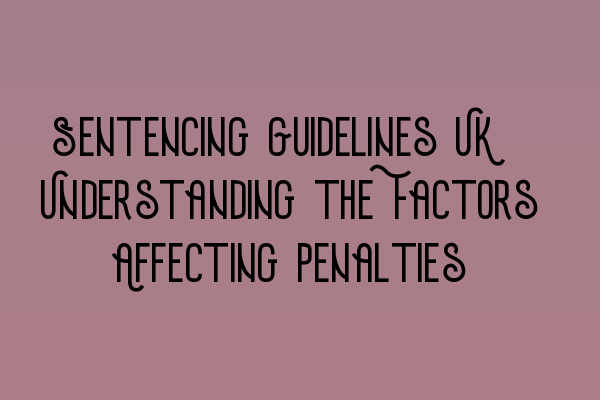Sentencing Guidelines UK: Understanding the Factors Affecting Penalties
As a leading law firm specializing in criminal law and practice in the UK, SQE Criminal Law & Practice Law UK aims to provide comprehensive legal guidance to both legal practitioners and aspiring solicitors. In this blog post, we will delve into the intricacies of sentencing guidelines in the UK and the various factors that can influence the penalties imposed.
The Importance of Sentencing Guidelines
Sentencing guidelines play a crucial role in the criminal justice system as they provide a framework for judges and magistrates when determining the appropriate penalty for a specific offense. These guidelines ensure consistency and fairness in sentencing, considering the nature and severity of crimes committed.
Understanding the factors that affect penalties can help legal professionals and individuals involved in criminal proceedings to better navigate the sentencing process.
Factors Affecting Penalties
There are several key factors that judges and magistrates take into account when determining the appropriate penalty:
- The Offense: The severity and nature of the offense committed are primary considerations in sentencing. More serious crimes with significant harm or damage will generally result in harsher penalties.
- Prior Convictions: The defendant’s criminal history is an important factor. Previous convictions may lead to increased penalties to prevent repeat offenses.
- Aggravating and Mitigating Factors: Aggravating factors, such as using a weapon or causing injury, can escalate the severity of the penalty. Conversely, mitigating factors, such as demonstrating remorse or cooperation, may reduce the penalty.
- Victim Impact: The harm caused to the victim, both physically and emotionally, is considered when determining the penalty. Courts aim to ensure justice for the victim and provide appropriate compensation or support.
- Public Interest: The impact of the crime on public safety and societal well-being is taken into account. Penalties may be increased to protect the community and deter future criminal behavior.
By analyzing these factors, judges and magistrates can make informed decisions regarding penalties, ensuring that they are proportionate to the crime committed.
Expert Legal Assistance to Navigate Sentencing Guidelines
Understanding the complexities of sentencing guidelines can be overwhelming, especially for individuals who are not well-versed in the legal system. That’s where SQE Criminal Law & Practice Law UK comes in.
Our team of experienced solicitors specializes in criminal law, staying up-to-date with the latest changes to sentencing guidelines. We provide expert guidance to legal practitioners and offer SQE preparation courses to aspiring solicitors who aim to excel in their legal careers.
If you’re preparing for the SQE 1 or SQE 2 exams, we offer comprehensive preparation courses to help you succeed. Check out our SQE 1 Preparation Courses and SQE 2 Preparation Courses to enhance your knowledge and skills.
If you want to assess your progress and test your knowledge, take advantage of our SQE 1 Practice Exam Questions and SQE 1 Practice Mocks FLK1 FLK2. These resources will help you familiarize yourself with exam-style questions and improve your confidence.
Stay informed about the latest SRA SQE exam dates by visiting our SRA SQE Exam Dates page. We strive to provide accurate and up-to-date information to ensure you are well-prepared for your exams.
Whether you’re a legal professional seeking expert assistance or an aspiring solicitor looking for comprehensive preparation, SQE Criminal Law & Practice Law UK is here to guide you throughout your legal journey.
Contact us today to learn more about our services and how we can help you achieve your legal aspirations.
